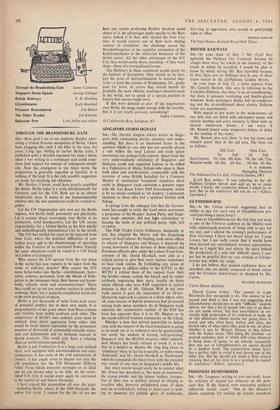TI
Si BI Gl Pr Tl R James Cameron George Edinger F. D. Harding Lady Bearsted Eric Baker Jon Kimche Lord Attlee and others 'rough the Brandenburg Gate ngapore Storm Signals itish Railways lyndebourne isoners Remembered le Other Exodus ;!octant Peer THROUGH THE BRANDENBURG GATE SIR,—How glad I am to see Anthony Hartley advo- cating a United Nations occupation of Berlin. I have been plugging this until I am blue in the face, for years. Long ago, during an earlier Berlin crisis, I published quite a detailed argument for such a move, when I was writing in a newspaper and could some- times find support for notions of outrageous simpli- ci y. Now the emergency is ten times worse the proposition is generally regarded as fanciful. It is nothing of the kind. It is the only sensible suggestion yet made for resolving this dilemma.
Mr. Hartley, I know, could have greatly amplified the theme. Berlin today is a crisis simultaneously for Germany and for the UN. Both are in an almost in extricable mess. It seems to me transcendentally obvious that the two quandaries could be treated to- gether.
Let the UN Organisation take over not the Berlin impasse, but Berlin itself, personally and physically. Let it assume direct sovereignty over Berlin as its permanent, solid headquarters.' Let the UN accept responsibility for a United Berlin as the first wholly and unchallengeably International City in the world.
The UN has needed for years to be removed from New York, where the practical difficulties of con- trolled access add to the disadvantages of operating within the frontiers of an interested Power. Exactly the same objections could be raised to a UN based on London or Leningrad.
Why cannot the UN operate from the one place in the world that now requires to be taken from the arena of cold-war dispute? Why cannot the UN move holus-bolus into Berlin—establishment, Secre- tariat, archives, personnel, from the Heads of Dele- gation to the messenger-boys, their homes and house- holds, schools, clubs and communications? There they could set up not just another enclave in another sovereign State, but a uniquely-constituted world city in the most practical of places.
Berlin is not thousands of miles from most areas of potential conflict, but in their very midst. It is geographically at the point where East-West contests and rivalries most visibly confront each other. The temperature of Berlin's own endemic crisis must be reduced, since direct aggression from either side would be made almost impossible by the permanent presence of thousands of presumably valuable states- men and diplomatists and an immense amount of shared property. This could only have a relaxing effect on world neuroses generally.
Berlin is not Timbuctoo; it is a large and civilised place, well equipped with accommodation and com- munications. It has none of the arid associations of Geneva. It has ample room to dispose not only the UN population but the UN Permanent Military ?olive Force which everyone envisages as an ideal in d no one knows what to do with. As the estab- ished UN City it would never again be canvassed is the capital of any future Germany.
I have argued this proposition all over the place tycluding Berlin, where, in the 1948 blockade, the lotion first arose. I cannot for the life of me see how any nation professing Berlin's freedom could object to it. Its advantages apply equally to the Rus- sians; indeed it is they who started the Free City idea. It would remove one of their most chafing sources of complaint: the challenge across the Brandenburgertor of the capitalist ostentation of the Kurftirstendamm to the utilitarian bleakness of the Soviet sector. All the other advantages of the UN City they would surely share, including—if they want them—those of a tranquillised Europe.
The Berliners in these conditions would surely be the luckiest of Europeans. They would, to be sure, pay the price of disfranchisement in national elec- tions—a price the citizens of Washington, DC, gladly paid for years. In return they would benefit by probably the most efficient municipal administration in the world, not to speak of a special position in history that anyone might envy.
If this were debated as part of the negotiations over Berlin the snags might emerge with the benefits. But is it not worth seriously considering?


































 Previous page
Previous page